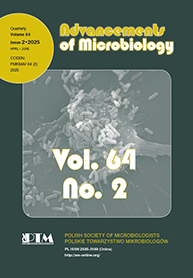1. Patogeneza choroby niedokrwiennej serca. 2. Choroba niedokrwienna serca jako proces zapalny. 3. Markery reakcji zapalnej w chorobie niedokrwiennej serca. 4. Czynniki bakteryjne a choroba niedokrwienna serca. 5. Podłoże autoimmunizacyjne choroby niedokrwiennej serca. 6. Białka szoku cieplnego (Hsp) – bodźce i tarcze w procesach z autoimmunizacji w chorobie niedokrwiennej serca. 7. Prozapalne działanie białek Hsp w chorobie niedokrwiennej serca. 8. Hipoteza cytotoksycznego działania przeciwciał przeciwko bakteryjnym białkom szoku cieplnego o masie cząsteczkowej 60 i 65 kDa w chorobie niedokrwiennej serca. 9. Podsumowanie
Abstract: The end of the previous century brought new findings concerning the role of inflammation and the infectious agents in the development of atherosclerosis. However, it is still not clear whether and how the infectious agents participate in the formation and the development of the atherosclerotic plaque. This article discusses the findings which to confirm the hypothesis that the bacterial Hsp proteins are factors promoting the autoimmune reactions and pathological processes leading to coronary heart disease. The involvement of bacterial Hsp proteins in the atherosclerotic processes is probably based on the upregulation of anti-Hsp60 autoantibodies produced in response to infection with a pathogen which produces Hsp60. Since the Hsp proteins are very conservative, the antibodies produced in response to bacterial Hsp60 may react with the human analogue Hsp60 exposed on the surface of endothelium. The complexes of autoantibodies and human Hsp60 proteins may induce the complement dependent cytotoxicity and promote inflammatory damage of the vessels.
1. Pathogenesis of coronary heart disease. 2. Coronary heart disease as an inflammatory process. 3. Markers of inflammation in coronary heart disease. 4. Bacterial factors and coronary heart disease. 5. Autoimmune background of coronary heart disease. 6. Heat shock proteins (Hsp) – the stimuli and the targets of autoimmune processes in coronary heart disease 7. Proinflammatory action of Hsp proteins in coronary heart disease. 8. The hypothesis of the cytotoxic effect of antibodies against bacterial Hsp60 and Hsp65 proteins in coronary heart disease. 9. Summary

